Sherlock Holmes and the Shakespeare Globe Murders Read online
Page 6
“That’s all very well, Holmes,” I interjected, “but where does Fiske fit into all this. Surely he wasn’t in this play, too?”
“No, I fancy not. I think we’ll find his involvement is more recent and, unfortunately for him, somewhat short-lived. And now, old friend, if you’ll excuse me, I have a few matters to attend to before we return to the Globe. If we should be a little later than our stated time, I feel sure they have enough to occupy them in the light of this morning’s events. Let us rendezvous here at two, if that would be convenient.”
Used as I was to Holmes’ sudden mood swings, I muttered something about needing to drop in and make sure the practice was under control or something such and, instead, set off for a leisurely stroll through Regent’s Park, while I tried to make some sense of recent happenings.
Somebody was intent on stopping an American impresario from building the replica of an Elizabethan theatre, to the point of threatening not only him and many of those closest to him but even the head of state. What was so special about this theatre? And what was the American connection? That seemed to explain Dame Ivy’s involvement but who were the two men who made up “we three”? And what had Fiske known that made him so dangerous? Not for the first time I felt frustrated that I had nothing concrete to offer Holmes. Yet I was left with the feeling that some time in the last twenty-four hours one of the characters in this play had said something that should have given me a clue.
At which point the excuse I’d used about my practice actually did obtrude on my conscience. I hailed a cab and for the next hour or two occupied my mind with mundane matters like prescriptions and paperwork.
Little better off, except for the physical exercise, I returned to Baker Street where, to my surprise I found a strange and rather rotund man sitting in Holmes’ usual chair. He had an unfashionably high collar and a high colour to go with it, which spoke of regular bouts with the bottle. Hair grew in tufts around the side of a shining bald pate but his most noticeable feature was a pair of bushy black eyebrows that perched there like caterpillars. When I asked him what he thought he was doing there, he replied in a voice clearly the worse for whisky that “Mr ’Olmes said as I should make meself comfortable and wait. He said this Watson feller would see me right.”
“Right?” I said, my temper rising rapidly. “I’m ‘this Watson feller’, as you call him, and I’ll see you right out of the door, my good man! I’ve never known such infernal cheek, sitting there as large as life, why …”
“Good old Watson,” said the voice of Sherlock Holmes, “I can always rely on you to guard my back or, in this case, my front as well. I declare you have the instincts of the British bulldog crossed with the Stag at Bay!” So saying, the rotund gentleman proceeded to peel off his bushy eyebrows, take the padding from inside his cheeks and use a none-too-clean kerchief to wipe off what I could now see was makeup from his face. Soon the features of a cheery imbiber was replaced by the infinitely more saturnine countenance of my friend.
“Forgive me but you know my fondness for assuming other identities. It has always been my conviction that one of the primary skills of someone in my profession is the ability to see through a disguise, which is why I take such trouble with my own. I feel it helps me to occupy temporarily the mind of an opponent.” He settled back comfortably, a sign that he had information to impart and a mind to do so.
“I was rather pleased with this new persona; in fact, I may use it again. The idea came into my mind, I must confess, when we saw Mr George Robey last night at the Oxford Music Hall. Not that I intend to attempt a comic song, Watson—you may set your mind at rest on that score! No, there is something about a cheerful looking man that softens people in their reaction to him. You will confide in such a man, particularly in the setting of a hostelry. Which is where I have spent my time since I saw you last. Several hostelries, in fact.” “Ah well,” I muttered, somewhat mollified, “at least it isn’t that filthy lascar you seem to inhabit so often. I suppose we should be grateful for small mercies.”
Holmes continued as if I hadn’t spoken. “I followed the trail of last evenings’s revellers and quite a trail it turned out to be. If I may piece together a variety of accounts derived from several different publicans in the Islington area, Fiske seems to have repaired direct from his abortive visit to Baker Street to his habitual haunt, The Barley Mow in Islington High Street. The landlord there professed him to be in high spirits, to the point where he was ordering whisky instead of his usual port. His ship was about to come in, he kept saying, which somewhat confused mine host, since he said he’d ‘always had him down as one of those actor fellers.’
“Later in the evening Fiske was apparently joined by a younger man he seemed to recognise, although by this time he was becoming rather maudlin and repetitive about his ‘ship’. According to the landlord—whose memory suddenly became remarkably retentive after a further pint of his own watery ale—Fiske seemed puzzled by something about his friend’s appearance. At one point he tried to tug the man’s beard and asked him why he was wearing it.”
“A false beard, I shouldn’t wonder,” I interjected. “Wanted to make sure no one could describe him later.”
“Thank you, Watson. That possibility had indeed occurred to me also,” Holmes smiled. “At which point the younger man paid their bill and hurried Fiske out. They were later seen at three other saloon bars with Fiske becoming steadily more inebriated. At the last—an insalubrious spot called The Frog and Parrot just one street away from Marsham Square—they were joined by a second young man, who arrived somewhat out of breath. His friend took him to task for being late and then became extremely agitated about the jacket the young man was wearing.”
“The jacket?”
“It appears he was sporting a flower in his button hole. A green carnation.”
“Phipps!”
“So it would appear. In any event, Gentlemen A tore the flower off and ground it underfoot. Soon after that he was heard to say—‘I think he could do with a little help.’ At which point he took a small syringe from Fiske’s pocket and handed it to the second man, together with a small glass capsule that he took from his own pocket. By this time Fiske was absent except corporeally and raised no objection when he was led out by the newcomer, leaving the bearded man to pay for the drinks. That was the last time they were seen—until this morning.”
Holmes settled himself into his chair and reached for a favourite pipe, so I knew there was more to come.
“My last port of call was Fiske’s lodging house. I had managed to glean the address from the first landlord. Assuming that the news would not yet have reached there, I posed as an acting colleague, sent by my forgetful friend to pick up a spare hat. The landlady was perfectly affable—if you make a living dealing with ‘rude theatricals’, I imagine a certain sangfroid is obligatory. She showed some surprise, however, that the ‘other young man’ didn’t pick it up when he was here earlier. Yes, Watson, I’m afraid we remain one step behind. It would appear that, while we were examining the remains of Mr Fiske, our literary friend was going through his possessions.”
“What do you imagine he was looking for?” I interjected.
“Oh, some sort of note, almost certainly,” Holmes replied, filling his old clay pipe ominously. “Something took place at the Globe yesterday after we left. Fiske saw or heard something that aroused his suspicions, presumably after Adler had given them some kind of explanation of events to date. Probably he saw the ‘three’ conferring. Not being the subtlest of men, his behaviour must have alerted them. One of them may have followed him when he paid us his abortive visit. Mrs. Hudson now remembers a second caller, a young man with a scarf around his face, which he attributed to neuralgia. He rang the bell shortly after Fiske’s departure, asking if Mr Sherlock Holmes was at home. Told he was not, he went away without leaving a message. So, since he had seen Fiske and knew he had left no note himself they could be reasonably sure no contact had been made.”
�
��So when you got to Fiske’s room, the cupboard was bare?”
“Not entirely. The room had been disarranged, though not badly. The writing table had been the main object of his attention, the top sheet of his pad had been roughly torn off and the waste paper basket emptied and discarded. I imagine Fiske had made several efforts to consign his thoughts to paper. It was the disarray that began to arouse the landlady’s suspicions. She gave clear signs of wanting to ask some embarrassing questions, until I gave her the benefit of the ale with which I had daubed my person to prevent my having to drink too much of the filthy stuff. There is one virtue of cheap ale, Watson, in the creation of an effective disguise. It tends to linger and create, as it were, a false scent.”
“So you came away empty-handed?”
“Oh, I wouldn’t go quite that far, my dear fellow.” And Holmes retrieved a scrap of paper from the recesses of his voluminous jacket, which he proceeded to smooth flat. From what I could see, it appeared to be totally blank. Holmes caught my questioning expression. “One thing the amateur criminal invariably fails to remember is that to remove the message is not to lose the message. A writer—particularly someone writing excitedly and in a hurry—will often press down hard on the paper. Thus, the second sheet, always providing one has the appropriate materials to translate it, speaks to us as clearly as the first.”
So saying, he rose to his feet, put down the clay pipe without lighting it—for which relief I gave much thanks—and moved over to the table which held his beloved chemical apparatus. There he busied himself for a few minutes, mixing things in a retort and then heating the results in a dish. Finally, he took a delicate brush and coated the paper. “Come and look at this, Watson … now then, Mr Fiske, what have you to say to us from beyond the grave, I wonder?”
Standing at Holmes’s shoulder but at a respectful distance from the all-pervasive ale, I watched fascinated as slowly the dead actor’s ghostly handwriting appeared …
“Dear Mr Holmes —”
I must see you. There is much to tell—of words poetic, of Roses and Globes, of shoes and ships and sealing-wax and cabbages and kings. Not to mention Danger. If anyone has doubt of the acoustics of our new home, he need have them no longer. Clarity is all! Considering the stakes, I imagine the labourer will be worthy of his hire? If so, your humble servant stands ready to piece out the imperfection of your thoughts.”
And then the flourish of the signature—
E. HAMILTON FISKE
“I think one might safely categorise his style as bravura, on stage or off,” Holmes said thoughtfully. “He presumably intended to leave this, should he once again find me out in the morning.”
“What does he mean about all this ‘sealing-wax’ nonsense?” I asked.
“Fiske was one of those people who are always ‘on’—as actors like to say,” Holmes replied. “Nothing was ever simple. He’s referring to some nonsense lines from Alice in Wonderland, so as to create a playful tone. I don’t believe for one moment he thought he was in any danger. On the contrary, he believed he had stumbled on a game in which he held all the worthwhile cards. A little game called blackmail in which he’d sell to the highest bidder. All this tavern talk about his ship coming in. Having missed us, his first and obvious port of call, he may well have decided as the evening wore on that the price of silence would be higher. He just wasn’t aware of the real game that was being played out in which he was a mere pawn.”
“What do you think happened, Holmes?”
“I fancy we shall find that our ‘bearded’ young man, satisfied that Fiske had not made the contact he feared, constructed a rapid scenario, brilliant in its simplicity, I must admit. It was generally known that Fiske was an advanced diabetic, I have now ascertained. Prime him with his favourite whisky, which is rich in sugar but can do him little real harm as long as there is the antidote of insulin. But replace the antidote with what he thinks is insulin but is, in reality, nothing more than a placebo, and the story is very different.”
“And if that didn’t work?”
“Then a knock on the head in a darkened alley that could hopefully be attributed to a drunken fall. More risky, certainly, but they had no time to devise something of greater finesse. You remember Constable Baker spoke of sensing someone’s presence in the square? That, I fancy, was our friend waiting to administer the coup de grâce should it prove necessary. As it happened, Plan A sufficed. I would give good odds that we shall find Fiske was dead either just before or just after he mounted his last horse. In either event, his death was ‘staged’ just as it might have been in a play. And, you know, Watson, the aspect that is beginning to worry me is precisely that theatricality. I’m sure it has not escaped your notice that even the threats are appropriate to the character concerned? ‘Cleopatra’ is confronted by an asp and ‘Richard’ loses his earthly kingdom on a horse. There is a perverted touch of—I would almost say genius—at work here that, in other circumstances, would be almost admirable.”
A silence fell between us as we pursued our separate thoughts. We’d reached this point often enough in the past and sometimes with even greater violence but it was always a sobering moment to realise that a human life was forfeit and that there was no retreat until the miscreant was brought to book. Even though I knew the adrenalin was coursing through my friend’s veins, the look he gave me told me he shared my qualms. This was no longer an amusing crossword puzzle to be laid aside, should it cease to entertain.
It was Holmes who broke the silence. “Time for Act Two, I think, Watson. If you will give me a moment or two to remove the motley, we will again present ourselves as the omniscient investigator and his fearless assistant.”
Chapter Six
An angry voiced echoed through the darkness: “The answer’s no, no and if that isn’t clear enough for your friends—NO! And you can tell them I’m goddamn tired of talking about it. In case they haven’t noticed, I’ve got a theatre to open and it’s going to be my theatre!”
It was undoubtedly Florenz Adler’s voice we heard as we picked our way through the labyrinth behind the stage towards what was clearly his temporary office. “Do you think we should come back later, Holmes?” I whispered. “Carpe diem, Watson,” he smiled and I could see he was enjoying the moment. “When the emotional temperature rises things normally safely hidden have been known to stir.” He knocked on the door and with the briefest of pauses we were in the room.
Standing behind the desk and resting his weight on his clenched fists was Adler. A vein throbbed visibly in his temple. Sitting in the chair next to the desk was a youngish bearded man, smoking a cigarette as if he hadn’t a care in the world. In fact, he seemed to be positively enjoying himself. He looked up as we came into the room and without bothering to get up, offered a languid hand.
“Good afternoon, Mr Holmes … Dr Watson … My father is expecting you. I was merely filling in time until you arrived.”
Turning to Adler, he dropped the cigarette on the floor and ground it out under his heel in a way that suggested his calmness was to at least some degree an effort of will. “Well, father, I’m sure you have more than enough to be getting on with. Don’t forget the offer stays on the table until the day of the opening. After that, all bets are off. My principals …”
“You know exactly what you can tell your principals …” shouted Adler, bringing a fist down on the desk. Looking at him now one could see the power he must have commanded on the stage.
The young man nodded, bowed slightly to Holmes and myself and was out of the door. Though I was bursting to speak, I followed my friend’s example and stayed silent. Holmes has impressed on me over the years the importance of letting the other person offer the information in the heat of the moment. “Few people can stand the burden of silence and, in order to shed it, they frequently make an ill-considered sacrifice.” So it appeared to be with the impresario. He slumped down into his chair and looked at us with a defeated expression. Or was there the merest glint in his eyes of self-p
ossession returning?
“I guess I owe you gentlemen an explanation?” Holmes’s expression remained carved in stone. There was to be no lifeline for Adler from that quarter.
“The young man you just met—not under the most advantageous circumstances, I admit—is my son Henry. By my first marriage,” he added. As he spoke, I suddenly recalled the entry in Holmes’s index. That would certainly bear further examination, as would the telegrams he had received earlier. I remembered now a reference to a ‘wife in New York’.
“I’m not particularly proud of my earlier life, Mr Holmes,” Adler continued. “Like a lot of young men, I was green in judgement and as a strolling player, I suppose I fancied myself quite a fellow. Travel around the country, strut a lot, fret not too much and worry about tomorrow not at all. Way back, when we were both far too young, I’d married a sweet little girl, Iris Tallis, in New York. Then, round about the time I was playing that accursed date in Chicago …”
“The one where the President was shot?” I asked.
“That’s right, Doctor. Our American Cousin. So many things seemed to go off beam after that. Well, as I was saying, it was then that Iris gave birth to our son. I wasn’t there, of course. And I guess that tipped the whole balance for her. All the travelling had been getting to her and …”—here he dropped his gaze—“all the rumours, I suppose. Anyway, by the time I finally got back to New York, she’d left and taken the baby with her. She went to a lot of different places, I heard later. I know Canada was one and then she finished up somewhere in England. A year or two later I got a notice to say she’d divorced me. I never saw her again and I’d never laid eyes on Henry until the other day—and I’ll come to that in a moment when I’ve got this off my chest. It’s been there a long time, Mr Holmes …”

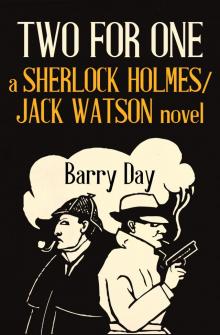 Two for One
Two for One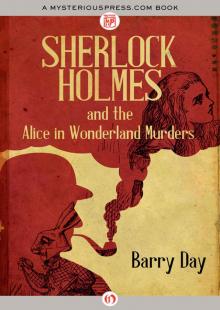 Sherlock Holmes and the Alice in Wonderland Murders
Sherlock Holmes and the Alice in Wonderland Murders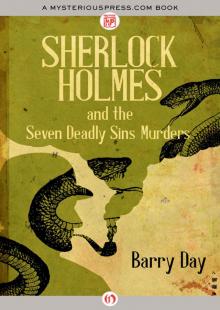 Sherlock Holmes and the Seven Deadly Sins Murders
Sherlock Holmes and the Seven Deadly Sins Murders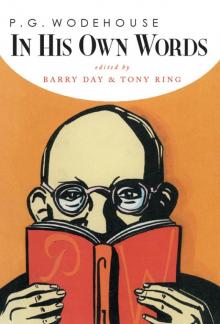 P.G. Wodehouse in his Own Words
P.G. Wodehouse in his Own Words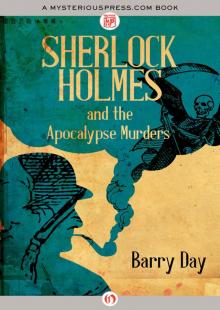 Sherlock Holmes and the Apocalypse Murders
Sherlock Holmes and the Apocalypse Murders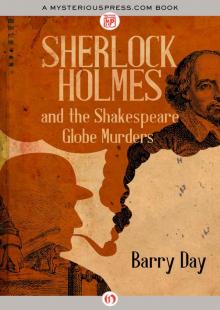 Sherlock Holmes and the Shakespeare Globe Murders
Sherlock Holmes and the Shakespeare Globe Murders